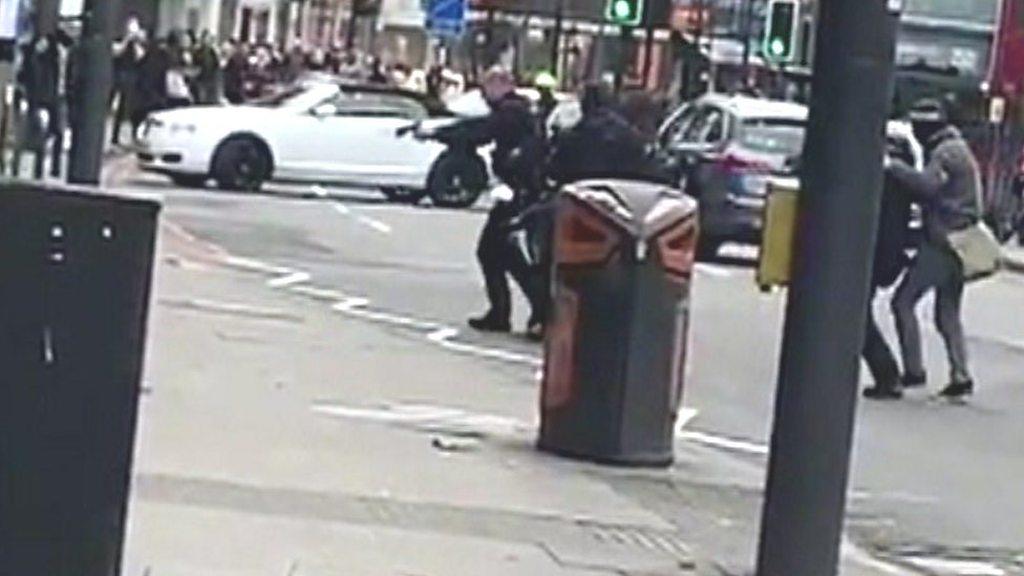Streatham attacker named as Sudesh Amman
- Published
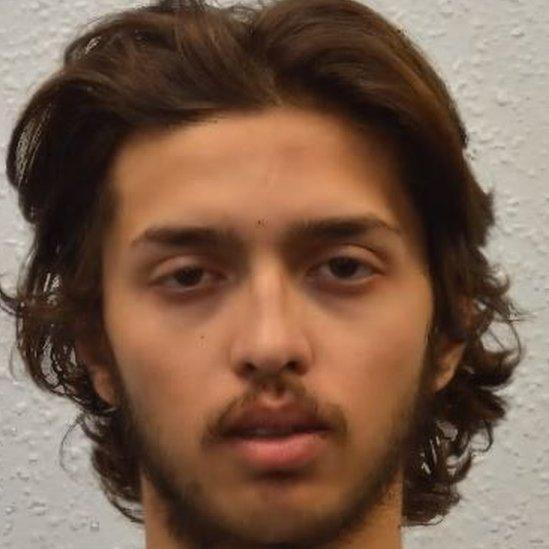
A man shot dead by police after he stabbed people in south London had been released from prison in January.
Sudesh Amman, 20, was released about a week ago after serving half of his sentence of three years and four months for terror offences.
He was under active police surveillance at the time of the attack on Streatham High Road, which police believe to be an Islamist-related terrorist incident.
Three people were injured but none is in a life-threatening condition.
Scotland Yard said officers were searching addresses in south London and Bishop's Stortford, Hertfordshire.
"No arrests have been made and inquiries continue at pace," the Metropolitan Police said.
Streatham MP Bell Ribeiro-Addy said: "He [Amman] was under surveillance quite soon after being released which begs the question, why was he released so soon?"
Treasury minister Rishi Sunak said "the police are obviously doing absolutely everything they can to keep people safe".
He said new measures to toughen terrorism laws - already announced by the PM after last November's attack near London Bridge - will give the police "more powers and resources to do that as well".
Prime Minister Boris Johnson said the government would announce further plans for "fundamental changes to the system for dealing with those convicted of terrorism offences" on Monday.
Video shows moments after police shooting
At the time of Amman's release there were concerns about the danger he might pose to the public but there were no legal mechanisms to keep him in prison, BBC political correspondent Chris Mason said.
Given November's attack also involved a man convicted of terrorism offences released mid-way through his sentence, our correspondent said there was "a desperate desire" within government to be seen to be acting quickly.
Gunshots were heard on Streatham High Road just after 14:00 GMT on Sunday.
Reports suggest Amman entered a shop and started stabbing people. It appears he then left the shop and stabbed a woman.
Witnesses reported hearing three gunshots and seeing a man lying on the ground outside a Boots pharmacy, as armed police approached and shouted at those nearby to move back.
Deputy Assistant Commissioner Lucy D'Orsi said armed officers were in "immediate attendance" after the attack
The Met Police said armed officers - who were part of a "proactive counter-terrorism operation" following the suspect on foot - were in "immediate attendance".
The man had a hoax device strapped to his body, police said.
The BBC's Daniel Sandford said the events appeared to unfold after witnesses saw an unmarked police car pull in front of another car near Streatham Common, forcing it to stop.
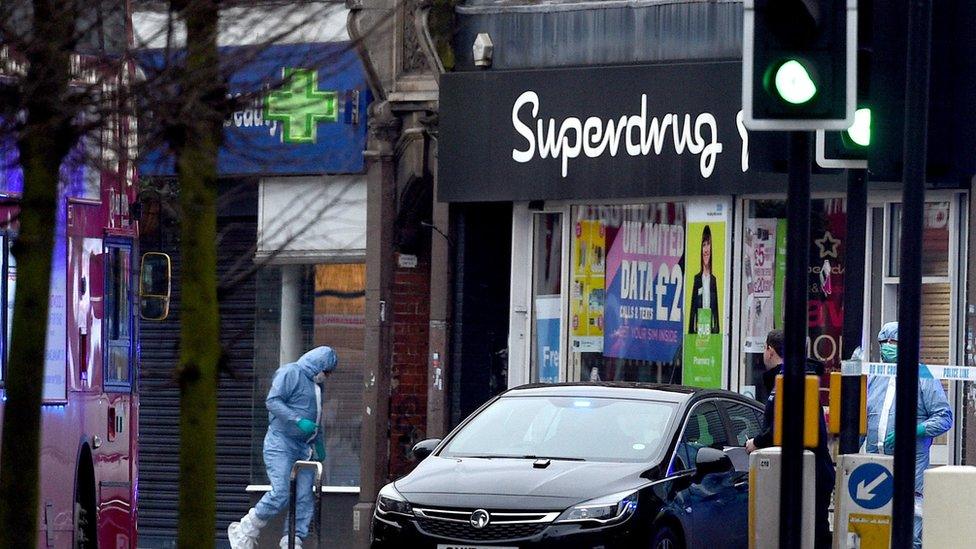
Forensic officers were seen working at the site into the evening
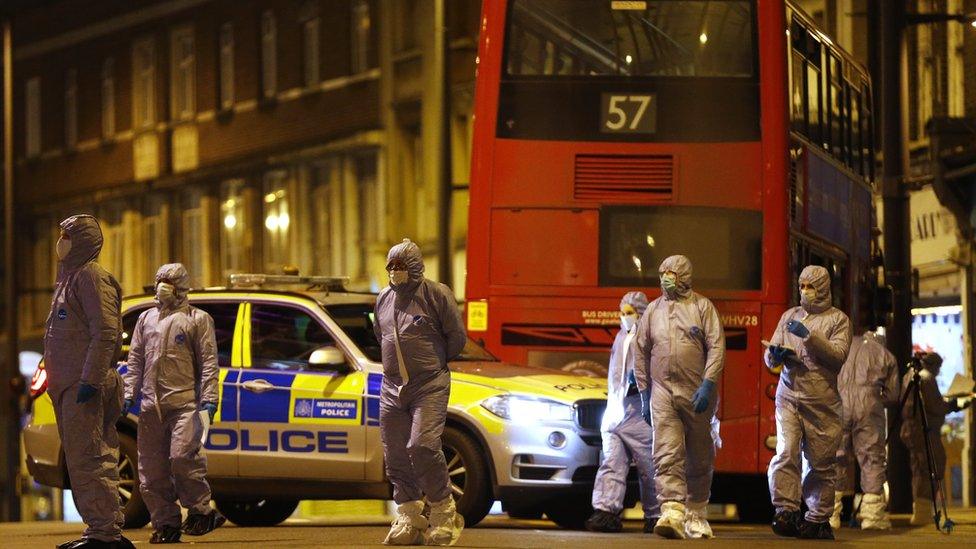
People who live locally spoke of their shock for the attack to have happened in Streatham
London Ambulance Service said it treated the three people for injuries at the scene and all were taken to hospital.
A man in his 40s was initially considered to be in a life-threatening condition but this is no longer the case.
A woman in her 50s whose injuries were not life-threatening has been discharged from hospital.
Another woman in her 20s continues to receive hospital treatment for minor injuries, believed to have been caused by glass following shots from the police.

Who was Sudesh Amman?
By Daniel De Simone, BBC home affairs reporter
Sudesh Amman pleaded guilty in November 2018 to six charges of possessing documents containing terrorist information and seven of disseminating terrorist publications.
One of the manuals Amman admitted owning was one about knife fighting.
He was jailed at the Old Bailey the following month for three years and four months.
I was there and recall Amman smiling as he was sentenced.
Amman was first arrested in north London in May 2018 by armed officers on suspicion of planning a terrorist attack.

Dave Chawner, who had been on the way to the cinema, told BBC Radio 4's Today programme: "I heard what I thought at that time was a car backfiring.
"I turned back and turned round and saw a small group of people around a man who was on the floor who was incredibly distressed, he was holding his lower right quadrant and there was blood everywhere.
"I happened to have a blanket in my bag and I gave it to them to help stem the bleeding and I ran to the nearest crossroads to wave down the ambulance."
Mr Chawner said the ambulance "took well over half an hour to arrive", which was "incredibly frustrating and distressing".
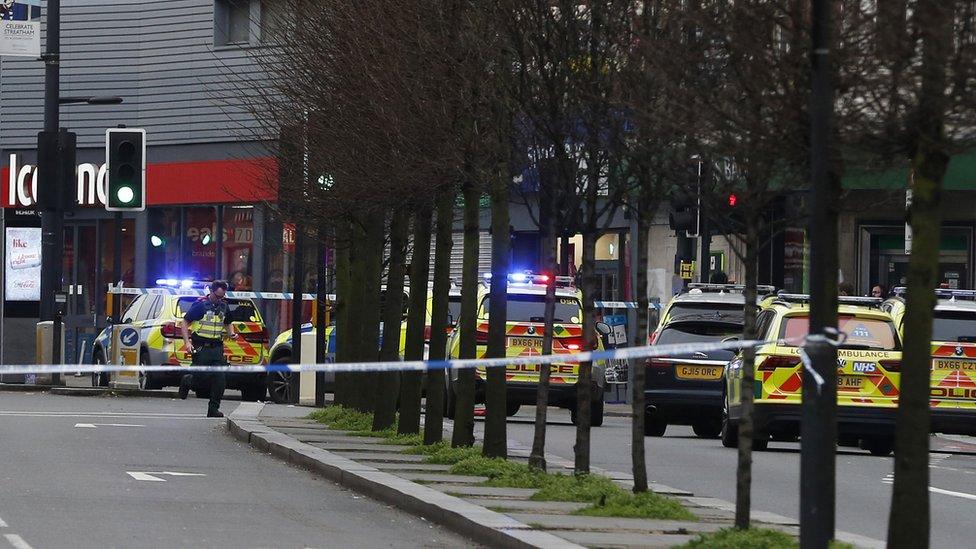
Early on, police said they were treating the incident as "terrorist-related"
Meanwhile, Gjon Kathegjolli said he was in a barber shop when he heard a woman, who was with a baby in a push chair and two young boys, scream and saw her being stabbed.
A man then walked past carrying a knife the size of his forearm, he said.
Daniel Gough said he was out for a run when he heard shots and everyone ran.
"There was panic, people were yelling," he said. "A young girl running alongside me kept asking 'Is this what I'm meant to do?' - she was very distressed.
"I saw a policeman and he yelled, telling everyone to get back. His gun was pointing in the direction of a man on the floor."
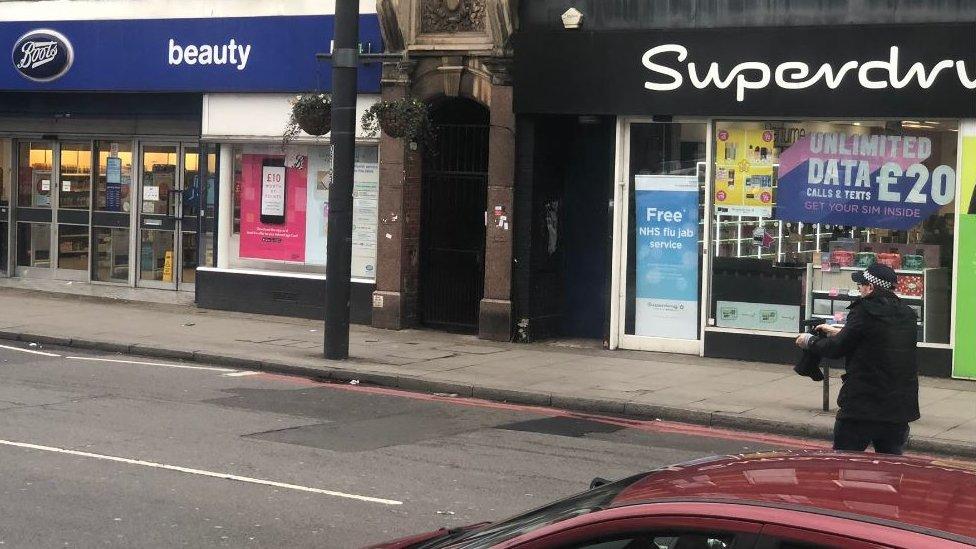
A police officer was seen pointing a gun at a man, who was seen on the floor outside Boots
Adam Blake, who was walking along Streatham Common, described how he saw two or three cars crash into each other, including an unmarked police car, as the incident unfolded.
"Another police car carried on towards the hill pursuing someone," he told the BBC.

Analysis
By Tom Symonds, BBC home affairs correspondent
The swift response of officers has almost certainly saved lives but there will be inevitable questions about the operation.
Counter-terrorist police and MI5 have about 3,000 so-called "subjects of interest" at any one time but a much smaller number are under round-the-clock surveillance because it takes a huge team of specialist officers to watch a suspect covertly.
This means that preventing terrorism is all about taking difficult decisions. Which suspects should be watched? What level of risk do they pose and when is the best time to make an arrest, given the need to capture real evidence?
Those decisions have become harder in recent years as would-be attackers are increasingly likely to act alone and to use low-tech weapons, sometimes on a whim.

Former military intelligence officer Philip Ingram told BBC Radio 5 Live it was "right and proper" that the government should assess the laws in place.
"We're treating these terrorists as criminals. You have to ask the question as to whether some of them may not ever be able to be rehabilitated and, therefore, is the law we have at the moment right and proper to keep the public safe?"
Officers from the Met's Counter Terrorism Command are leading the investigation into the incident.
Streatham High Road remains closed and a cordon is in place, with enhanced police patrols in the area.
The prime minister said his thoughts were with those injured and their loved ones and he paid tribute to the "speed and bravery" of emergency services who responded.
Mayor of London Sadiq Khan said: "Terrorists seek to divide us and to destroy our way of life - here in London we will never let them succeed."
Police are appealing for information, images and footage of the incident which can be shared via www.ukpoliceimageappeal.com or on 0800 789 321.
- Published3 February 2020
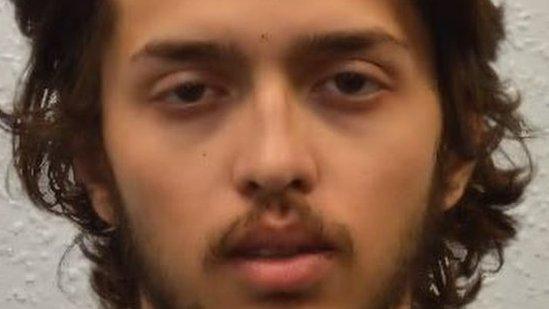
- Published2 February 2020
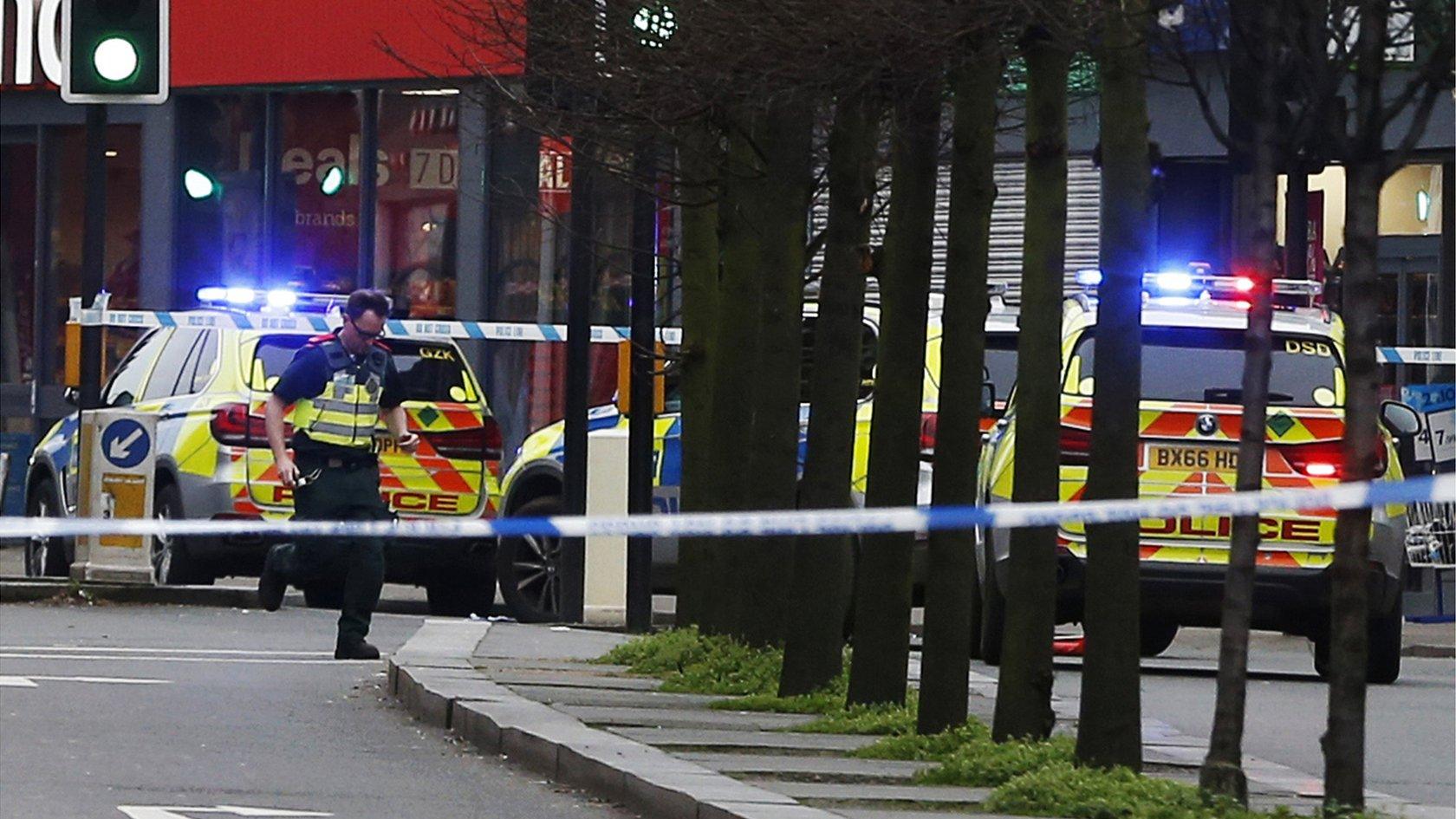
- Published2 February 2020
